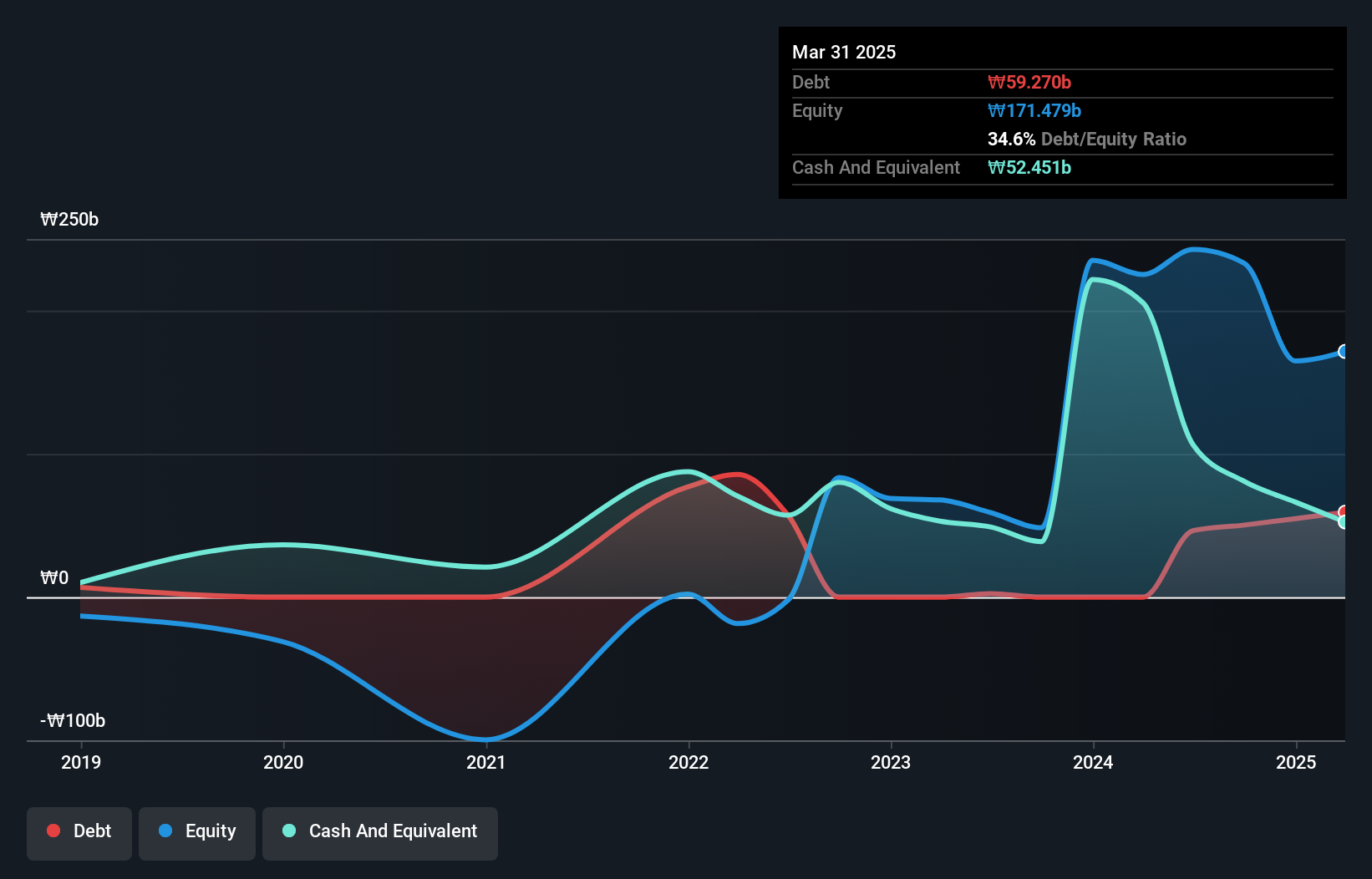Legendary fund manager Li Lu (who Charlie Munger backed) once said, 'The biggest investment risk is not the volatility of prices, but whether you will suffer a permanent loss of capital.' So it might be obvious that you need to consider debt, when you think about how risky any given stock is, because too much debt can sink a company. We note that Lunit Inc. (KOSDAQ:328130) does have debt on its balance sheet. But should shareholders be worried about its use of debt?
Why Does Debt Bring Risk?
Debt assists a business until the business has trouble paying it off, either with new capital or with free cash flow. Ultimately, if the company can't fulfill its legal obligations to repay debt, shareholders could walk away with nothing. However, a more frequent (but still costly) occurrence is where a company must issue shares at bargain-basement prices, permanently diluting shareholders, just to shore up its balance sheet. Having said that, the most common situation is where a company manages its debt reasonably well - and to its own advantage. When we think about a company's use of debt, we first look at cash and debt together.
What Is Lunit's Debt?
As you can see below, at the end of March 2025, Lunit had ₩59.3b of debt, up from none a year ago. Click the image for more detail. On the flip side, it has ₩52.5b in cash leading to net debt of about ₩6.82b.

A Look At Lunit's Liabilities
We can see from the most recent balance sheet that Lunit had liabilities of ₩225.2b falling due within a year, and liabilities of ₩17.3b due beyond that. Offsetting this, it had ₩52.5b in cash and ₩20.1b in receivables that were due within 12 months. So it has liabilities totalling ₩170.0b more than its cash and near-term receivables, combined.
Of course, Lunit has a market capitalization of ₩1.12t, so these liabilities are probably manageable. However, we do think it is worth keeping an eye on its balance sheet strength, as it may change over time. Carrying virtually no net debt, Lunit has a very light debt load indeed. The balance sheet is clearly the area to focus on when you are analysing debt. But ultimately the future profitability of the business will decide if Lunit can strengthen its balance sheet over time. So if you're focused on the future you can check out this free report showing analyst profit forecasts.
Check out our latest analysis for Lunit
In the last year Lunit wasn't profitable at an EBIT level, but managed to grow its revenue by 255%, to ₩68b. That's virtually the hole-in-one of revenue growth!
Caveat Emptor
Despite the top line growth, Lunit still had an earnings before interest and tax (EBIT) loss over the last year. To be specific the EBIT loss came in at ₩76b. When we look at that and recall the liabilities on its balance sheet, relative to cash, it seems unwise to us for the company to have any debt. Quite frankly we think the balance sheet is far from match-fit, although it could be improved with time. Another cause for caution is that is bled ₩69b in negative free cash flow over the last twelve months. So suffice it to say we consider the stock very risky. There's no doubt that we learn most about debt from the balance sheet. But ultimately, every company can contain risks that exist outside of the balance sheet. For instance, we've identified 2 warning signs for Lunit (1 shouldn't be ignored) you should be aware of.
At the end of the day, it's often better to focus on companies that are free from net debt. You can access our special list of such companies (all with a track record of profit growth). It's free.
New: AI Stock Screener & Alerts
Our new AI Stock Screener scans the market every day to uncover opportunities.
• Dividend Powerhouses (3%+ Yield)
• Undervalued Small Caps with Insider Buying
• High growth Tech and AI Companies
Or build your own from over 50 metrics.
Have feedback on this article? Concerned about the content? Get in touch with us directly. Alternatively, email editorial-team (at) simplywallst.com.
This article by Simply Wall St is general in nature. We provide commentary based on historical data and analyst forecasts only using an unbiased methodology and our articles are not intended to be financial advice. It does not constitute a recommendation to buy or sell any stock, and does not take account of your objectives, or your financial situation. We aim to bring you long-term focused analysis driven by fundamental data. Note that our analysis may not factor in the latest price-sensitive company announcements or qualitative material. Simply Wall St has no position in any stocks mentioned.
About KOSDAQ:A328130
Lunit
Provides AI-powered software and solutions for cancer diagnostics and therapeutics in South Korea.
Slightly overvalued with limited growth.
Similar Companies
Market Insights
Community Narratives




